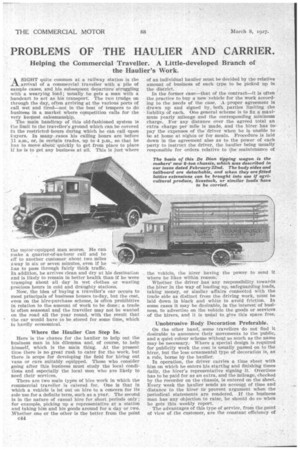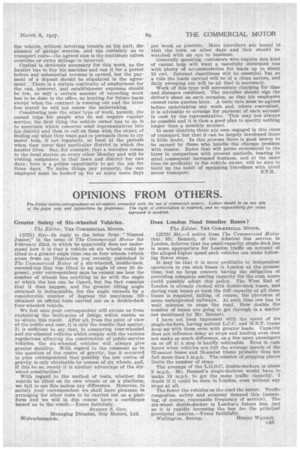PROBLEMS OF THE HAULIER AND CARRIER.
Page 66

Page 67

If you've noticed an error in this article please click here to report it so we can fix it.
Helping the Commercial Traveller. A Little-developed Branch of the Haulier's Work.
ASIGHT quite common at a railway station is the arrival of a commercial traveller with a pile of sample cases, and his subsequent departure struggling with a wearying load; usually he gets a man with a handcart to act as his transport. The twO trudge on through the day, often arriving at the various ports of call wet and tired—not in the best of tempers to do business in a market where competition calls for the very keepest salesmansbip.
The main handicap of this old-fashioned system is the limit to the traveller's ground which can be covered in the restricted-hours during which he can call upon buyers. In many eases his calling hours are before II a.m., or, in certain trades, up to 4 p.m., so that he has to move. about quickly to get from place to place if he is to get any business at all. This is just where the motor-equipped man scores. He can make a quarter-of-an-hour call and be off to another customer about two miles away in six or seven minutes, even if he has to pass through fairly thick traffic. In addition, he arrives clean and dry at his destination and is likely to remain in better health than if he were tramping about all day in wet clothes or wasting • precious hours in cold and draughty stations.
Now, the idea of buying a traveller's car occurs to most principals of business houses to-day, but the cost, even on the hire-purchase scheme, is often prohibitive in relation to the amount of work to be done; a trade iS often seasonal and the traveller may not be wanted on the road all the year round, with the result that the car would have to be stored for some time,, which is hardly economical.
Where the Haulier Can Step In.
Here is the chance for the haulier to help out the business man in his dilemma and, of course, to help himself, which is the main thing. At the present time there is no great rush to cater for the work, but there is scope for developing the field for hiring out vans or cars suitably equipped. Those who consider going after this business must study the local conditions and especially the local men who are likely to need their services.
There are two main types of hire work in which the commercial traveller is catered for. One is that in which a vehicle is let out on hire to a concern for its sole use for a definite term, such as a year. The second is in the nature of casual hire for short periods only ; for example, picking up a representative at a station and taking him and his goods around for a day or two. Whether one or the other is the better from the point
c44
of an individual haulier must be decided by the relative amount of business of each type to be picked up in the district.
In the former case—that of the contract—it is often the practice to buy a new vehicle for the work according to the needs of the case. A proper agreement is drawn up and signed by both parties limiting the liability of each. One general scheme is to fix a maximum yearly mileage and the corresponding minimum charge. For any distance over the agreed total an extra charge per mile is made, and the hirer has topay the expenses of the driverwhen he is unable to be at home at nights or for meals. Procedure is laid down in the agreement also as to the power of each party to instruct the driver, the haulier being usually responsible for orders relative to the maintenance of the vehicle, the hirer having the power to send it where he likes within reason.
Whether the driver has any responsibility towards the hirer in the way of loading up, safeguarding loads, taking money, or similar affairs connected with the trade side as distinct from the driving work, must be laid down in black and white to avoid friction. In some cases it may be desirable, in the interest of business, to advertise on the vehicle the goods or services of the hirers, and it is usual to give this space free.
Unobtrusive Body Decoration Preferable.
On the other hand, some travellers do not find it desirable to announce their movements to the public, and a quiet colour scheme without so much as the name may be necessary.. Where a special design is required for publicity work the cost is usually passed on to the hirer, but the less ornamental type of decoration is, as a rule, borne by the haulier.
In operation, the driver carries a time sheet with him on which he enters his starting and finishing times daily, the hirer's representative signing it. Overtime has to be paid for as an extra, and the mileage, checked by the recorder on the chassis, is entered on the sheet. Every week the haulier sends• an account of time and distance to the hirer to prevent argument when the Periodical statements are rendered. If the business man has any objection to raise, he should do so when he gets this weekly report.
The advantages of this type of service, from the point of view of the customer, are the constant efficiency of the vehicle, without involving trouble on his part, the absence of garage worries, and the certainty as to transport costs—the agreed sum is the maximum unless overtime or extra mileage is incurred.
Capital is obviously necessary for this work, as the haulier has to buy his machine and run it for a period before any substantial revenue is earned, but the payment of a deposit should be stipulated in the agreement. There is a certain continuity of employment for the van, however, and establishment expenses should be low, as only a certain amount of recording work has to be done in the office, no hunting for future loads except when the contract is running out and the hirer has stated he will not renew the -undertaking.
Considering now the other 'type of work, namely, the casual trips for people who do not require regular service, the first thing the vehicle owner has to do is to ascertain which concerns send representatives into his district and then to call on them with the object of finding out what they want and to persuade them to try motor help, if not regularly, at least at the periods when they cover that particular district in which the haulier lives. Say, for example, that a traveller comes to the local station on every other Monday and will be visiting costumiers in that town and district •for two days ; here is a golden opportunity to get the job for those days. To make things pay properly, the van employed must be booked up for as many more days per week as possible. More travellers are bound to visit the town on other days and they should be watched with an eye to business.
Generally speaking, customers who require this kind of casual help will want a tastefully decorated van with plenty of accomModation for loads up to about 10 cwt. Internal cleanliness will be essential, but as a rule the loads carried will be of a clean nature, and daily sweeping out will be all that is necessary.
Work of this type will necessitate charging for time and distance combined. The traveller should sign the driver's sheet on each occasion, so that his employers cannot raise queries later. A basic rate must be agreed before undertaking any work and, where convenient, it is advisable to arrange for payment of each account in cash by the representative. This may not always • , be possible and it is then a good plan to specify nothing longer than a monthly account. • In most districts there are men, engaged in this class of transport, but that it can be largely developed there is little doubt. In this process there is good money to be earned by those who handle the charges problem with reason. Rates that will prove economical to the hirer in comparison with present methods, bearing in mind consequent increased business, and at the same time be profitable to the vehicle owner, will be sure to build up the habit of equipping travellers with hired motor transport. S.T.R.












































































































